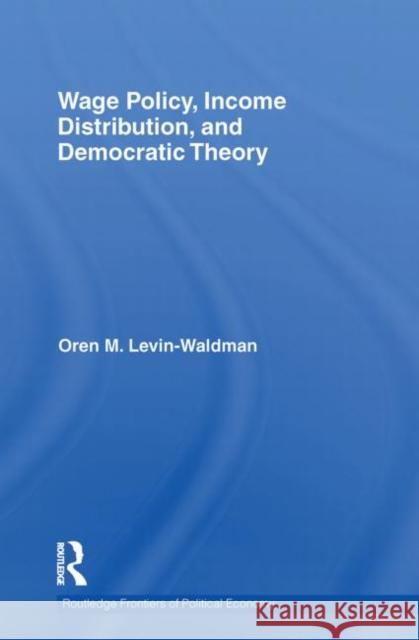Wage Policy, Income Distribution, and Democratic Theory » książka
Wage Policy, Income Distribution, and Democratic Theory
ISBN-13: 9780415750110 / Angielski / Miękka / 2013 / 240 str.
Wage Policy, Income Distribution, and Democratic Theory
ISBN-13: 9780415750110 / Angielski / Miękka / 2013 / 240 str.
(netto: 214,08 VAT: 5%)
Najniższa cena z 30 dni: 216,55
ok. 22 dni roboczych.
Darmowa dostawa!
This book explores the relationship between wage policy, distribution of income, and ultimately how that distribution impacts on democratic theory. In doing so, it examines the types of policies that are critical to the maintenance of a sustainable democracy. Wage policy, long the domain of economists (particularly neoclassical economists whose focus has been their impact on labour markets and income distribution), has largely been ignored by democratic theorists. Levin-Waldman argues that because wage policy can shape overall income distribution, it has a significant effect on equality levels and is therefore core to democratic theory. Its potential to enhance individual autonomy, which is a necessary condition for democratic participation, is another reason why wage policy should be at the centre of democratic theory. This book argues that the evolution in wage policy has paralleled economic transformations, which democratic theory has evolved to accommodate. Through a careful analysis of democratic theory and empirical analysis of the impact of wage policy on income distribution, this book concludes that wage policy is an important component in the maintenance of democratic society. A wage policy that raises the wages of those at the bottom can give workers more independence and power as they are placed on more equal footing with managers. This, in and of itself, can be a source of empowerment, effectively enhancing their autonomy. By doing so, workers feel less exploited and income inequality is reduced. This significant contribution explores the meaning of democratic theory and how it has evolved along with the meaning and specific forms of wage policy, providing invaluable new insights into their connections. This book will be of interest to postgraduates and researchers in economics and political science, as well as policy practitioners interested in issues of income inequality or democratic theory.











